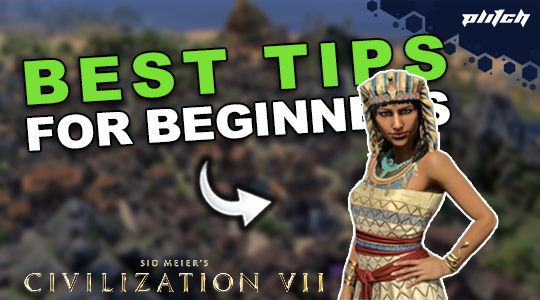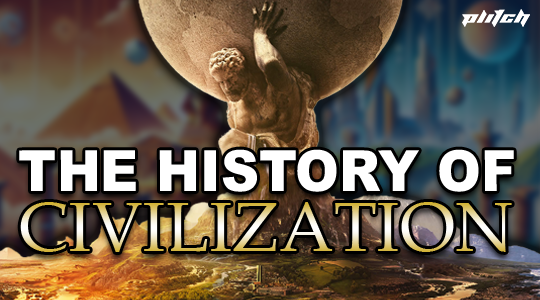We’re more than excited about the new installment in Sid Meier’s epic strategy series, so let’s take a look at all the new features in Civilization 7!
Table of Contents
The Ages System
Civilization VII breaks new ground with its innovative Ages system, a feature that revolutionizes the series by dividing gameplay into three distinct chapters: Antiquity, Exploration, and Modern. Your empire evolves with each Age. Instead of sticking with one civilization throughout the game, you’ll choose a new civ at the beginning of each Age based on your previous actions and historical connections. This approach allows you to create a unique cultural lineage that blends the legacies of multiple civilizations into a cohesive empire.
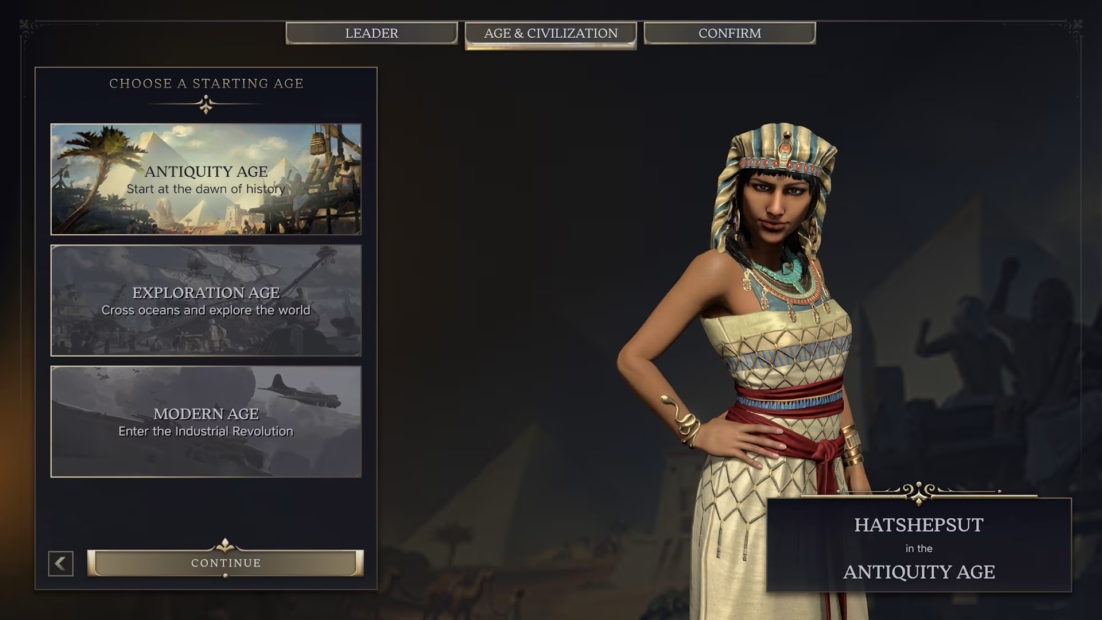
Addressing Long-Standing Issues
The Ages system addresses two major gameplay issues:
- Snowballing: The game mitigates scenarios where one player becomes unstoppable by resetting the playing field at the beginning of each age. Age transitions allow underperforming players to change strategies and keep the competition alive.
- Micromanagement: Each Age focuses on a tighter, more streamlined gameplay experience. With civilizations tailored to their respective Ages, players engage with era-specific abilities, units, and technologies, making every decision impactful.
Crises and Legacy Paths
A prominent feature of the Ages system is the introduction of Crisis events and Legacy Paths:
- Crises: At the climax of the Antiquity and Exploration Ages, you’ll face challenging Crisis events that force you to adopt Crisis Policies—temporary penalties that test your strategic adaptability.
- Legacy Paths: Each Age offers scientific, military, cultural, and economic objectives. Completing these objectives unlocks bonuses and sets the stage for the next Age. Achieving all the milestones in a path earns a Golden Age Legacy while falling short results in a Dark Age Legacy, which affects your strategy going forward.
A New Era of Leaders and Civilizations
Civ 7 brings a game-changing twist to one of the franchise’s most iconic mechanics: leaders and civilizations are no longer locked together. Instead, you can mix and match any leader with any civ at the start of a game.
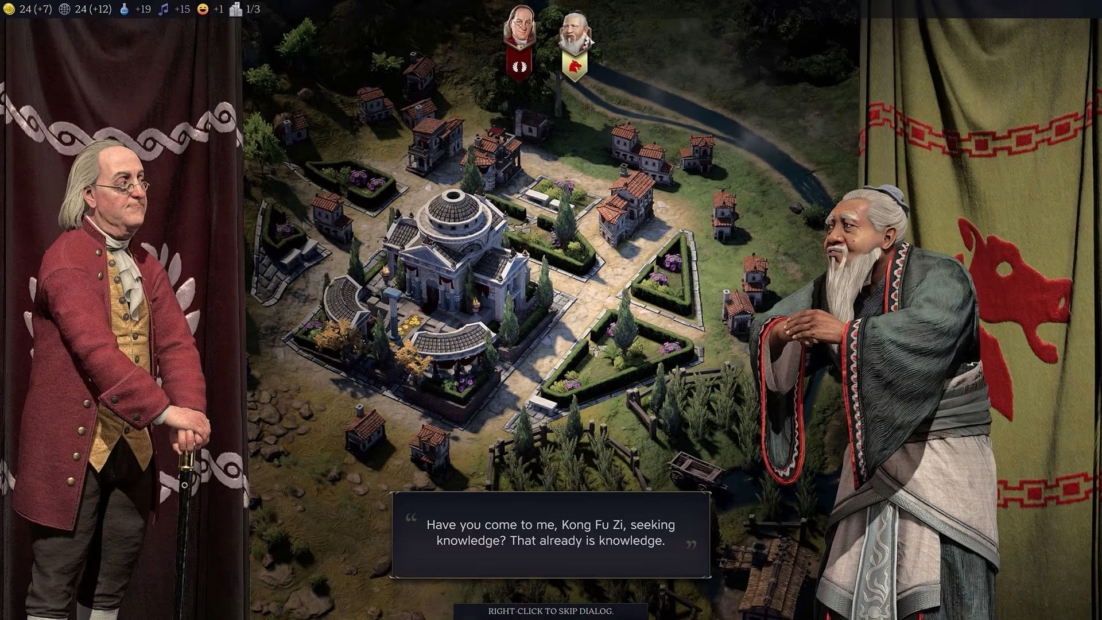
The Mechanics of Leaders and Civilizations
Each civilization in Civilization VII is tied to a specific Age, meaning you get to play them at their peak. Each civilization comes with:
- A Unique Ability that defines its strengths
- Unique Infrastructure, which can be a special building, district, or improvement
- A Civic Tree that unlocks specific traditions and policies
- A Signature Wonder that the civ gets bonuses toward building
- Unique Units, both civilian and military
- A Starting Bias that affects where they tend to spawn on the map
The Leaders and Their Unique Attributes
A major new addition to Civilization VII’s leaders is the Attribute System, which further customizes their play style. Attributes are divided into six categories:
- Cultural
- Diplomatic
- Economic
- Expansionist
- Militaristic
- Scientific
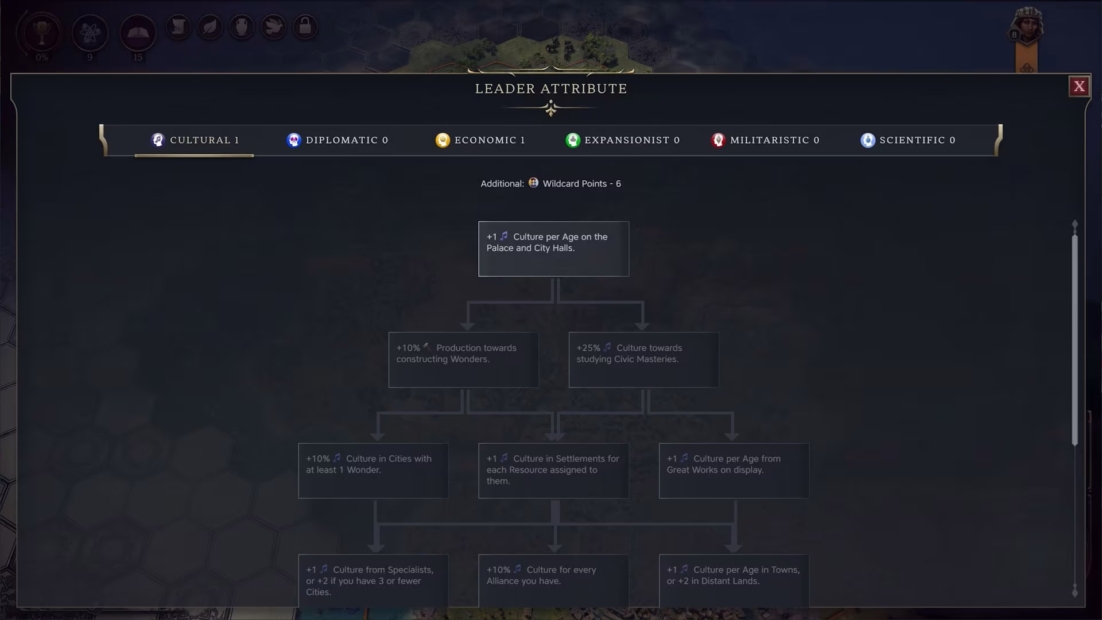
Your leader’s strengths in these areas determine how easily they earn Attribute points, which can be spent on specialized Skill Trees. These attributes and their bonuses persist through the Ages, ensuring that your leader’s influence grows over time, even as your civilization changes.
New Features in Civilization 7: Cities and Towns
Towns: The Essence of Your Empire
In previous Civilization games, settlers always founded cities, leading to an ever-growing web of production queues and infrastructure demands. Civ VII introduces a significant change: settlers now establish towns instead. These towns support your empire by converting production directly into gold, streamlining expansion without requiring constant supervision.
Unlike cities, towns have no build queue, so you don’t have to micromanage each new settlement. Instead, you can use their gold production to purchase units and buildings. Later, if a town proves valuable, you can upgrade it to a city by spending gold.
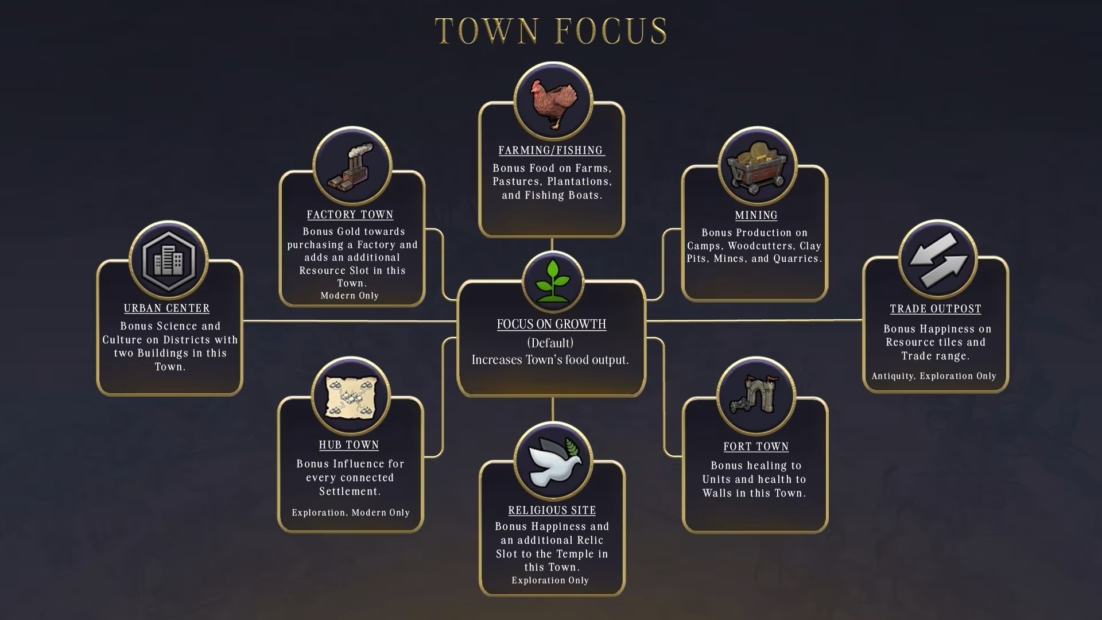
Another key feature of towns is specialization. Each town can take on a permanent role that grants unique bonuses, such as:
- Farming Town: Boosts Food production from farms, pastures, and plantations.
- Mining Town: Increases production from mines, quarries, and other resource-based improvements.
- Trade Outpost: Enhances trade range and generates extra happiness from resource tiles.
- Fort Town: Provides defensive bonuses and improves unit healing.
- Religious Site: Boosts the happiness generated by temples throughout your empire.
Cities: A More Hands-On Approach to Growth
Cities in Civ VII work differently than in past entries. Previously, a growing city would automatically expand its borders to claim adjacent tiles. Youmust manually choose which tiles to annex as your city grows.
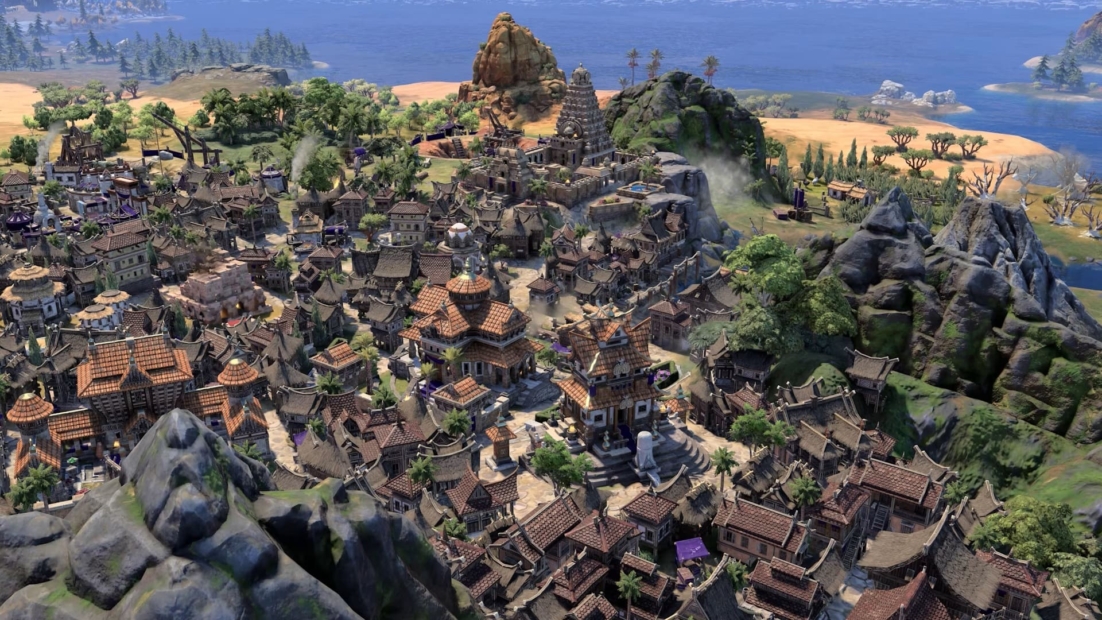
Key changes to cities include:
- No more workers: Improvements such as farms and mines are automatically constructed when a tile is annexed. This eliminates the repetitive task of moving workers around and makes growth feel more natural.
- Evolving infrastructure: Older buildings lose their unique effects and adjacency bonuses when entering a new Age. This encourages you to replace outdated buildings and keep your cities modern and efficient.
Civilization VII’s Emergent Narrative: Bringing Your Empire’s Story to Life
One of Civilization VII’s most exciting new features is the Emergent Narrative system, a dynamic way to weave storytelling into your empire’s journey.
What is the Emergent Narrative System?
It tracks key moments in your game, such as wars, cultural milestones, or technological breakthroughs, and generates events that reflect your empire’s journey. Each event presents you with choices that shape your civilization’s identity. There’s no right or wrong choice—just decisions that reflect your empire’s values. Over time, these choices build upon one another, creating a layered historical narrative.
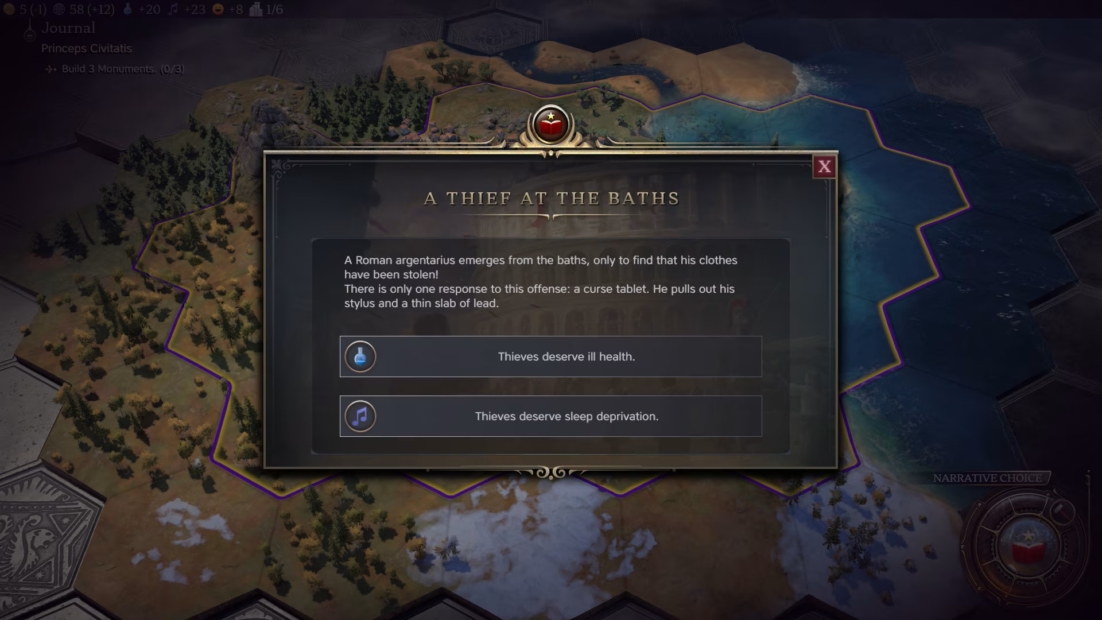
How It Works
The system operates through a combination of modifiers and narrative tags:
- Modifiers define the event’s triggers and outcomes. Some are tied to your leader’s personality, while others depend on your civilization’s play style.
- Narrative tags track your choices over time, allowing for callbacks to previous decisions.
Different Types of Narrative Events
Emergent Narrative events come in several forms:
- Historical events: Inspired by real history, these bring moments like medical breakthroughs, artistic rivalries, or military conquests to your game.
- What-if scenarios: These events explore the possibilities of alternate history.
- Unique gameplay moments: Your empire’s achievements, failures, and traditions contribute to its evolving story. A golden age, a devastating war, or a new religious belief can all trigger new narrative moments.
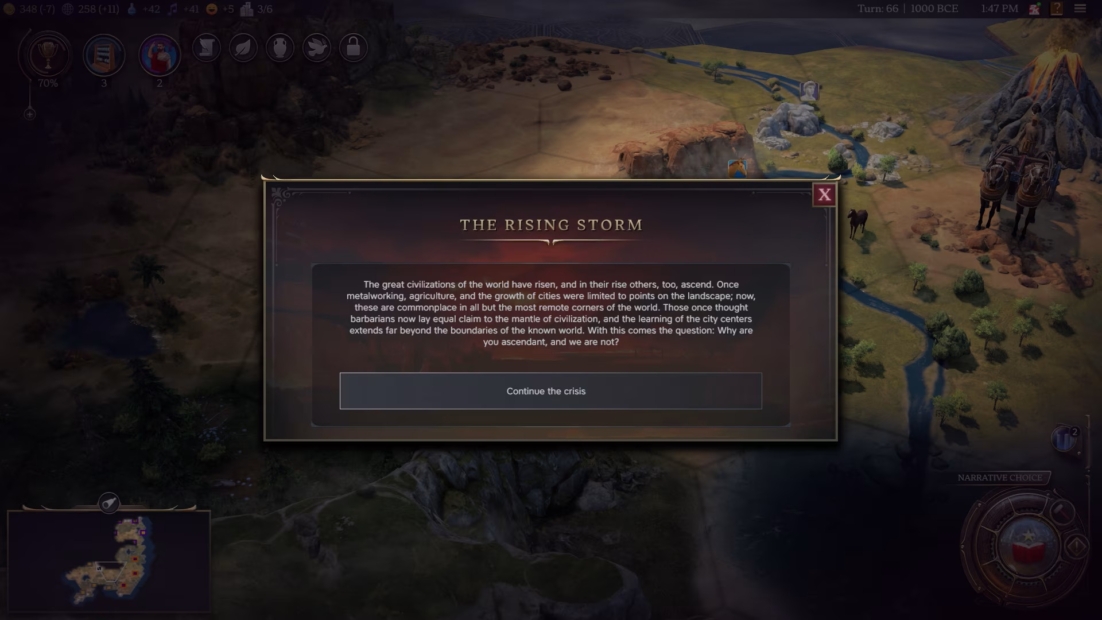
Systemic Events: Adding Personality to Mechanics
In addition to handcrafted narrative moments, Civilization VII integrates systemic events into the gameplay. These recurring scenarios provide narrative context for game mechanics. Instead of being just another notification, these events now feel like meaningful parts of your civilization’s evolving story.
The New Face of Warfare
Commanders: The Backbone of Your Military
The Commander unit is the most significant addition to Civ VII’s combat system—a powerful military leader that brings both strategic depth and convenience to your armies.
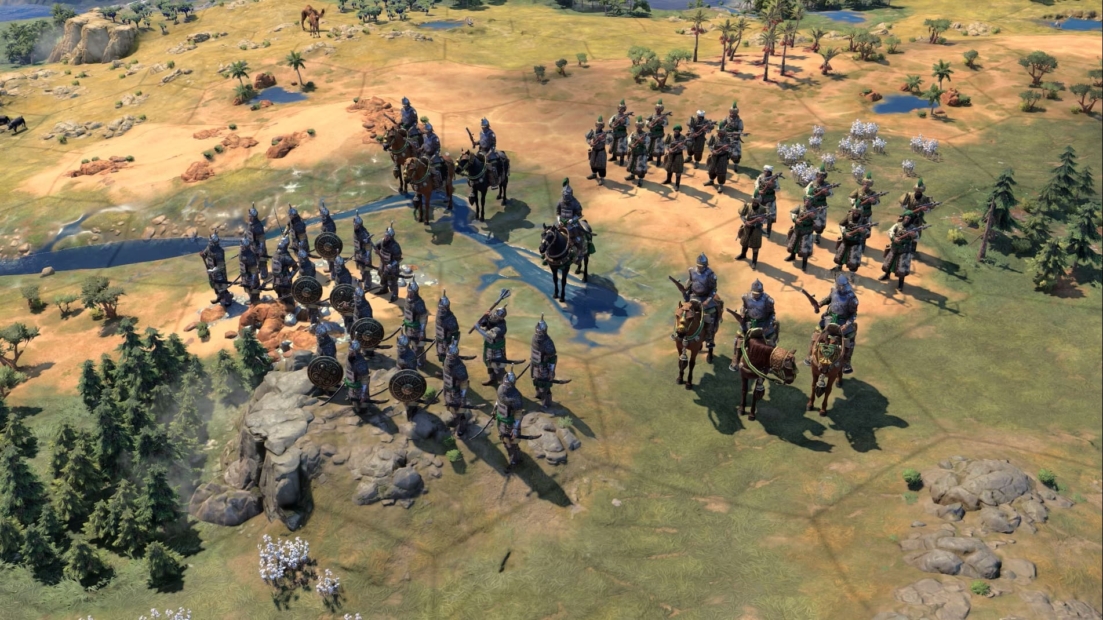
Key Features of Commanders
- Unit stacking & deployment: Commanders allow you to stack multiple units together for easier movement. They can “unpack” and deploy units on adjacent tiles when they reach a destination.
- Experience & promotions: As the only units that gain experience, Commanders unlock powerful promotions that enhance their own abilities and those of nearby troops.
- Command radius & orders: Commanders provide passive buffs to nearby units and can issue special battlefield orders.
- Specialization Paths: Commanders can specialize in a variety of ways, with five different promotion trees:
- Bastion: Defensive buffs to keep armies standing strong.
- Assault: Offensive perks for leading devastating attacks.
- Logistics: Enhancements to efficiently manage larger armies.
- Maneuver: Increased mobility and strategic positioning.
- Leadership: Boosts that make the Commander itself more powerful.
A New Approach to Sieges
Cities in Civ VII span multiple tiles, so siege warfare has been overhauled. No longer can you simply attack a single tile to capture an entire city. Instead, each district must be conquered separately, meaning that urban centers with strong defenses will require careful planning to take down.
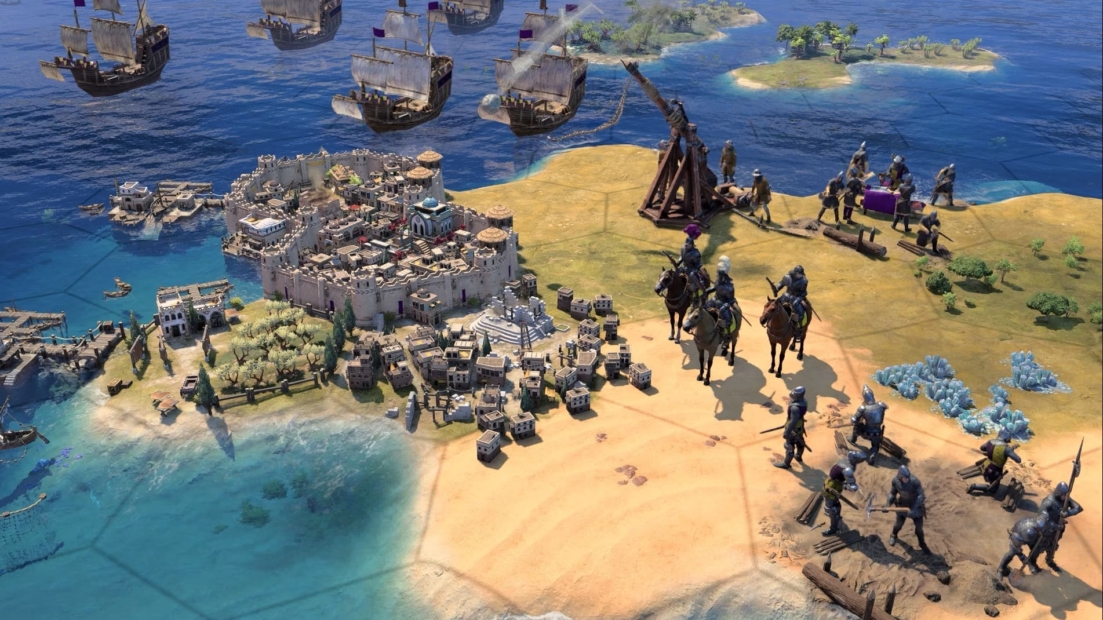
Key changes to sieges:
- Walls protect individual districts, not just the city center.
- Destroying or capturing districts weakens the city’s economy and defenses.
- Naval invasions are now more viable, as ships can sail inland on rivers to attack poorly defended settlements.
Improved Battle Visuals & Flanking Mechanics
Combat in previous Civ games could sometimes feel stiff, with units taking turns attacking in an almost turn-based RPG fashion. In Civ VII, the animations have been revamped to feel more fluid, with battles continuing visually until a unit is destroyed or the turn ends.
Additionally, flanking mechanics now play a more critical role. Engaging an enemy unit locks it into a “front,” allowing for bonus damage from side or rear attacks. This makes unit positioning more critical than ever and rewards you if you use clever tactics instead of brute force.
Diplomacy, Influence, and Trade
Influence: The Currency of Diplomacy
Like gold, Influence is a powerful new asset accumulated over time. It’s the key resource for diplomatic actions, allowing you to shape relationships, broker deals, and manipulate world politics.
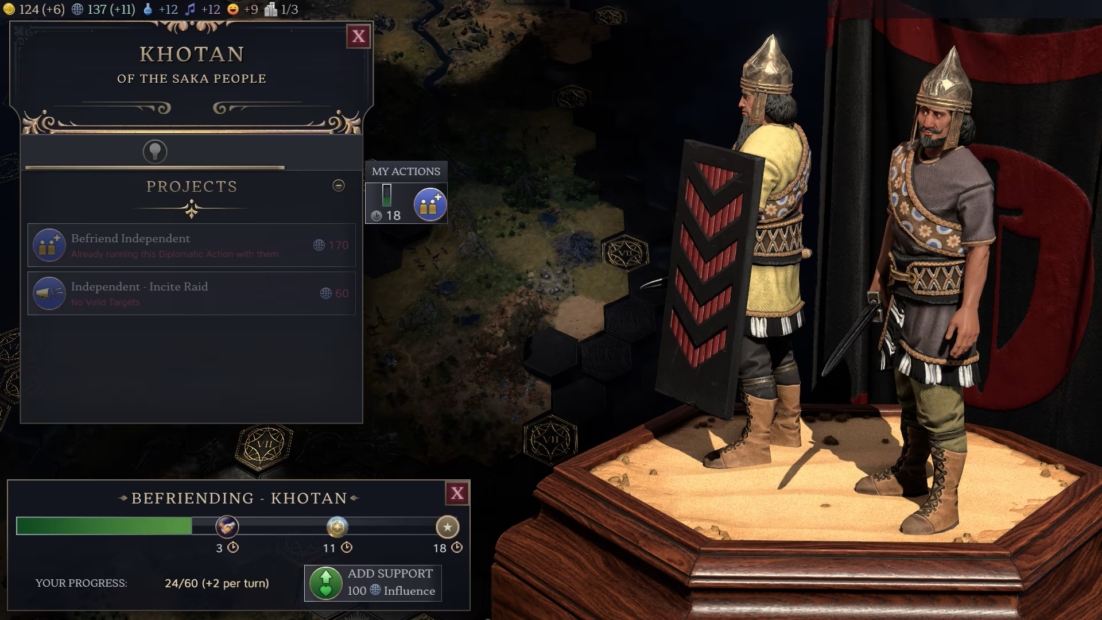
Diplomatic actions requiring Influence fall into four main categories:
- Endeavors: Mutually beneficial actions, such as research collaborations that advance science for both players.
- Sanctions: Negative actions that harm an opponent, like hindering military production.
- Treaties: Long-term agreements, such as open borders or trade pacts.
- Espionage: High-risk, high-reward moves like stealing technology, with the risk of damaging your diplomatic reputation.
Leaders can respond to these actions in one of three ways: Support (fully agreeing and sharing costs), Accept (allowing the action but benefiting the initiator more), or Reject (blocking the action at an influence cost).
Relationships, Agendas, and War
Diplomacy isn’t just about making deals—it’s about managing relationships. Leaders have agendas that define their priorities and preferences. Aligning with their goals can improve relationships, while opposing them can turn friends into enemies. Relations are categorized into five stages: helpful, friendly, neutral, unfriendly, and hostile. Your diplomatic actions influence these relationships and affect the options available to you.
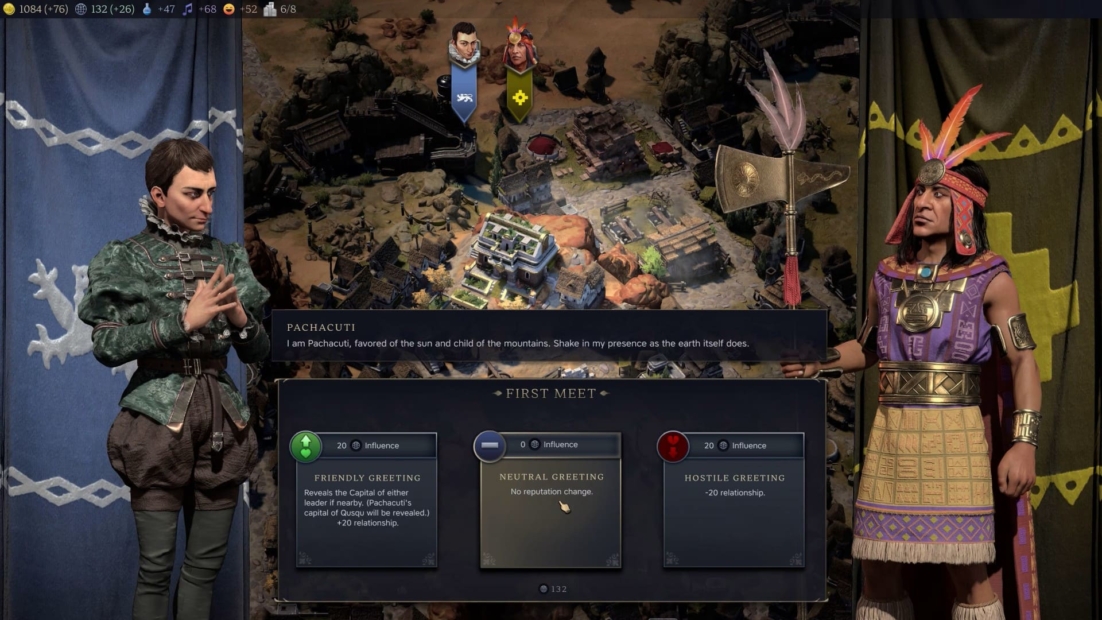
An important new war mechanic in Civilization VII is war support. Civilizations with less war support suffer from war weariness, which reduces happiness and military effectiveness. Declaring a formal war (when relations are already hostile) has no penalty, but a surprise war will boost the defender’s War Support. Influence can be used to sway war efforts, either by increasing your own support or by fomenting conflict between other empires.
Trade: A More Seamless System
Trade has been redesigned to be more intuitive and less about micromanagement. The old deal table has been replaced with a streamlined system where resources are automatically acquired through settlement growth, trade routes, and city-state alliances.
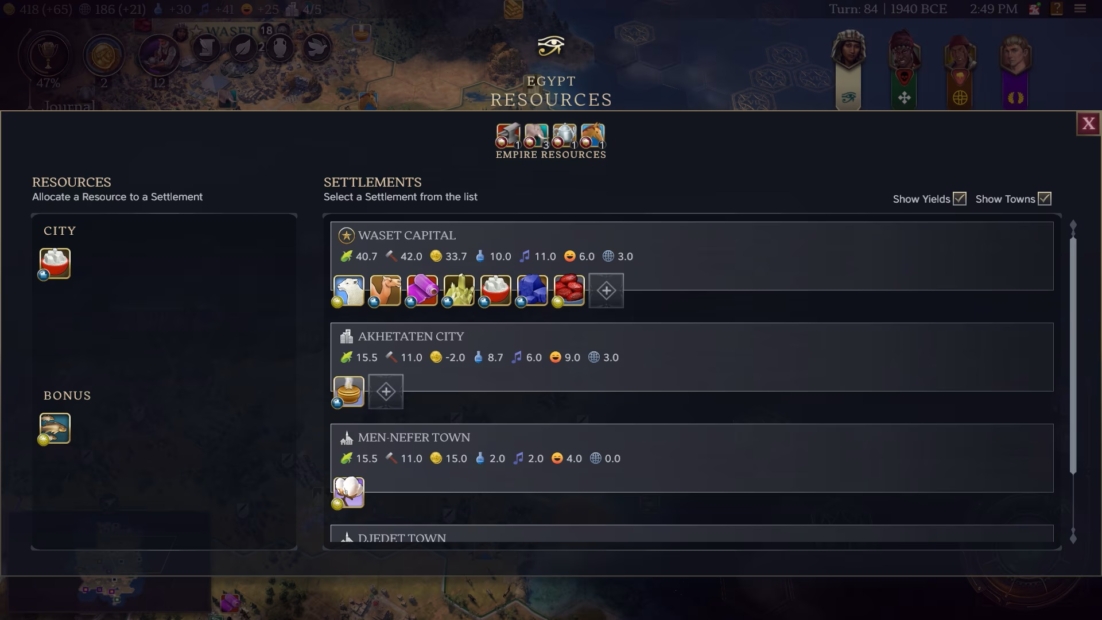
How to acquire resources:
- Growth events: When a settlement expands, it automatically builds an improvement to harvest all resources in the new area.
- Trade routes: Sending a merchant unit to a nearby settlement secures copies of local resources.
- City-states: Some city-states provide exclusive resources to their suzerains.
Resources are now categorized into:
- Empire resources: Provide bonuses to your entire civilization (e.g., Iron).
- City resources: Boost the specific city they’re assigned to, specializing in science, culture, or gold.
- Bonus resources: Flexible, allowing you to assign them to any settlement to increase production or happiness.
The New Trade Route System
Trade routes are now more automatic but still strategically important. You unlock merchant units through civics, and sending one to a foreign settlement establishes a trade route. These can be:
- Land routes: Shorter range but create roads between the connected settlements.
- Sea routes: Longer distances, but more profitable.
Once established, trade routes will continue to generate caravans or ships – though enemies can still plunder them!
Exploring the New Legends System
Civilization VII brings a fresh take on progression with its Legends System, a meta-progression feature designed to track and reward your accomplishments across multiple playthroughs.
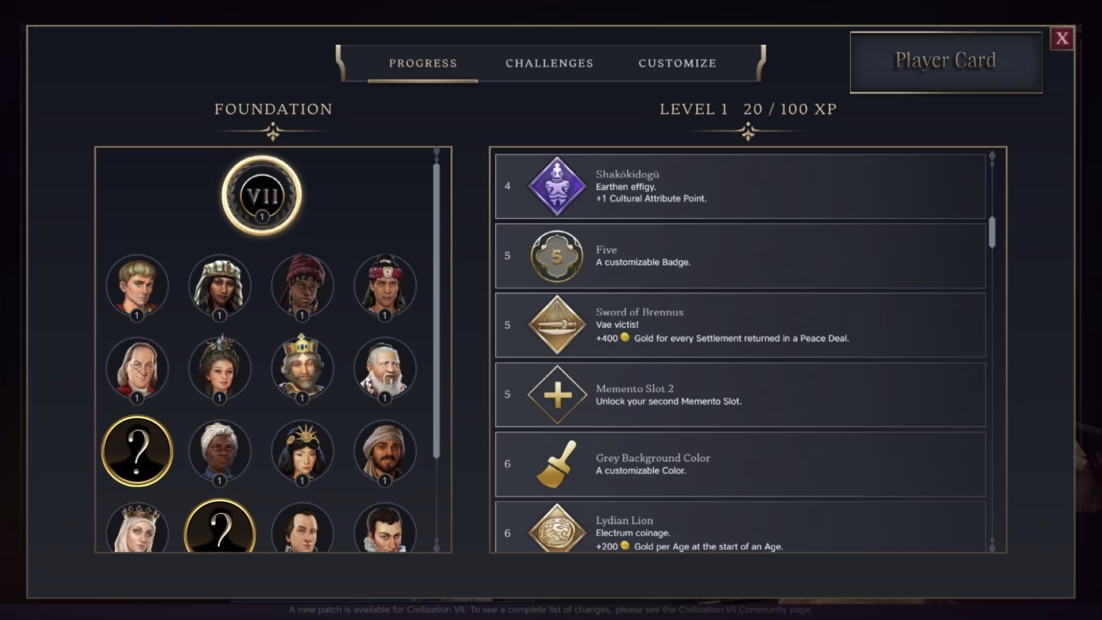
The goal:
- Make losing fun: Even in a losing game, you’ll earn progress and rewards based on your achievements, making those rough defeats a little less painful.
- Encourage completion: Offering unlockables at the end of a campaign will motivate you to see your civilizations through to the end.
- Promote experimentation: With over 30 civs and countless strategies, Legends encourages you to step out of your comfort zone and try new approaches.
Paths & Challenges: Leveling Up in Civilization
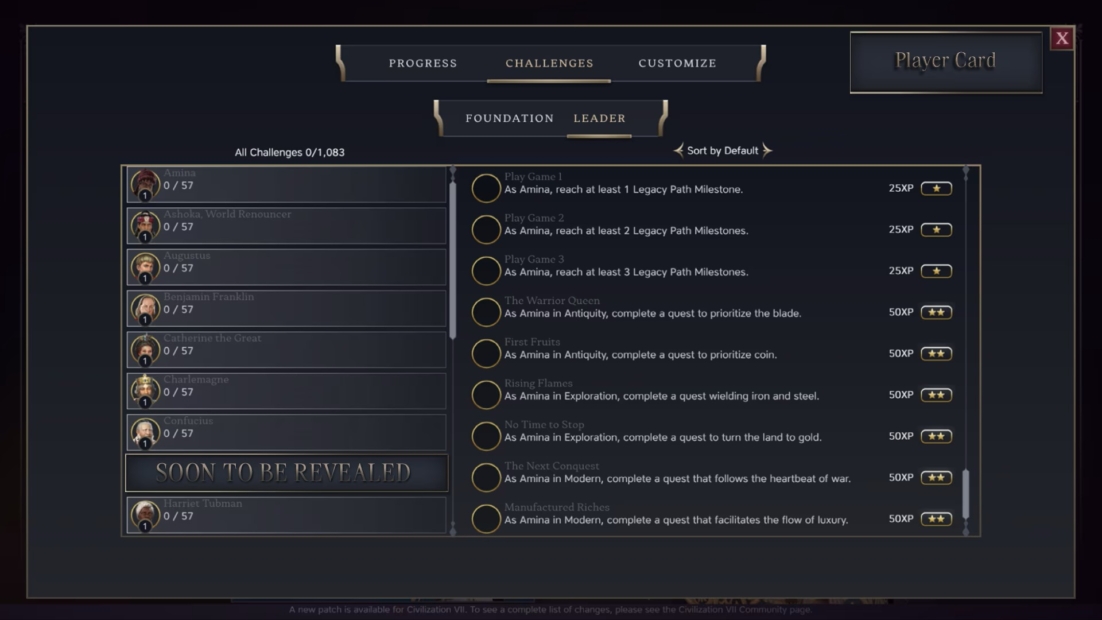
At the heart of the Legends system are Paths, which act as experience tracks that you can level up over time. These are divided into two categories:
- Foundation path: Tracks your general progress across all playthroughs, maxing out at level 50.
- Leader paths: Individual progression tracks for each leader, with their own unique 10-level system.
To level up these paths, you’ll need to complete challenges, which act as goals that reward Legend XP upon completion. These can be as simple as playing a certain way or experimenting with different strategies.
Rewards and Mementos: What’s in It for You?
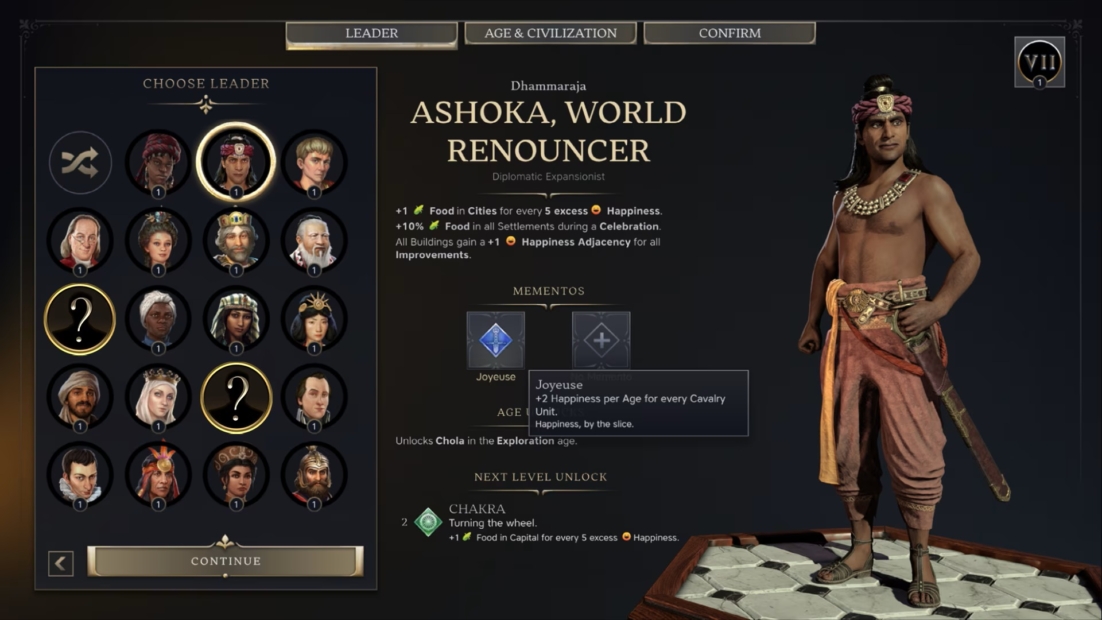
As you progress through the Legends system, you’ll unlock two main types of rewards:
- Cosmetic Collectibles: Customization options for your player card, including badges, banners, titles, and unique borders and background colors.
- Mementos: Special in-game milestones that reflect your past achievements and victories.
These rewards are designed to be fun but not mandatory, allowing you to engage with the system at your own pace while still enjoying meaningful bonuses.
The New Victory System Explained
Civilization VII shakes up how you achieve ultimate domination by introducing an all-new Victory system. You’ll progress through four Legacy Paths—Cultural, Economic, Military, and Scientific—by completing milestones throughout the game. In the final Modern Age, completing a Legacy Path unlocks a victory condition. These aren’t instant wins; each requires additional actions—typically about 20 turns of dedicated effort—before you can claim the throne.
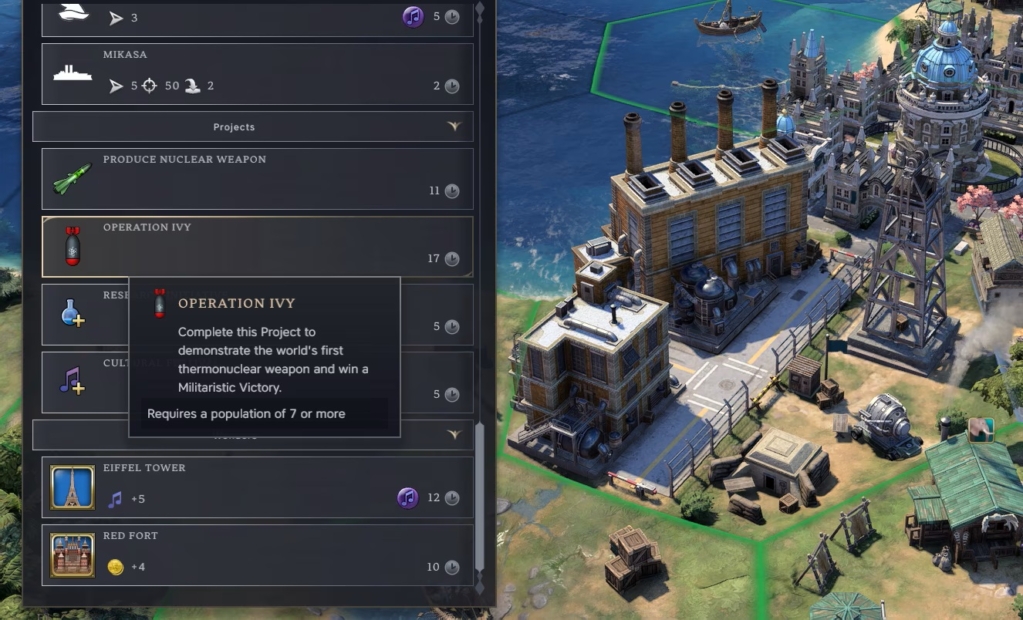
Let’s look at the four types of victories and what it takes to claim them.
- Cultural Victory: If you’ve focused on Culture, your ultimate goal is to build the World’s Fair Wonder. To unlock it, you must complete the Modern Cultural Legacy Path and build it in one of your cities to secure the victory.
- Economic Victory: An empire built on gold and trade finds its way to victory through the World Bank. After completing the Modern Economic Legacy Path, you’ll receive a Great Banker Unit in your capital. This unit can fly between other capitals and establish a World Bank Office. The game is yours once you’ve established offices in every capital.
- Military Victory: Completing the Modern Military Legacy Path unlocks the Manhattan Project Wonder, giving you an immediate nuclear weapon and the ability to build more. Your ultimate goal is to develop Operation Ivy and unlock the devastating hydrogen bomb.
- Scientific Victory: After completing the Modern Science Legacy Path, you’ll unlock the Staffed Space Flight Project. Building this in a city with a Launch Pad secures Victory.
New Comfort Changes for Civilization in PLITCH
We have great news for all Civilization fans! Not only does Civ 7 bring a host of new features and improvements, but we have also enhanced our software, PLITCH, to make using our codes in the popular strategy game series even easier and more convenient.
Previously, users had to manually select the correct version of the game before launching – a challenge as Civilization often has multiple executables (.exe) for different graphics modes (e.g., DirectX, Vulkan) or hardware requirements. If you chose the wrong option, you couldn’t activate any codes.
That’s no longer the case! Thanks to our new technology, PLITCH automatically detects which version of the game you’re running. Just click on “Start,” and PLITCH will adjust automatically. So everything runs smoothly without you having to worry about the technical details.
Over the past few years, we have made several improvements to help us with future Civilization games and DLC. More optimizations are already in the works to give you the best gaming experience possible! If you want to learn more about PLITCH, check out this blog!
Happy Gaming!
